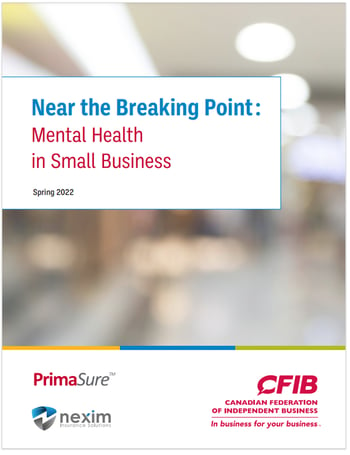 Michelle Auger, Manager, National Business Issues and Projects
Michelle Auger, Manager, National Business Issues and Projects
Corinne Pohlmann, Senior Vice-President, National Affairs
CFIB would like to thank PrimaSure, a Nexim Canada Insurance Solution, for sponsoring this report.
Executive Summary
Small firms make up 98% of employer businesses across Canada.1 There are many initiatives in place to support entrepreneurship, ranging from specialized financing, training, and government programs designed to encourage the development and growth of small and medium-sized enterprises (SMEs). However, in contrast to efforts in larger companies, there have been few policy conversations around the emerging priority of the mental health of the people who own and/or work in smaller firms.
Creating a workplace that promotes mental health and well-being has many benefits. In fact, SMEs are well placed to create an environment where employees feel appreciated, valued, and included—making it easier to address such taboo topics as mental health and well-being.
The global pandemic has amplified many concerns of small business owners over the past two years. Since mid-April 2020, CFIB has been collecting data on the most significant worries of small business owners with respect to COVID-19. Overwhelming stress has been chief among their concerns throughout the pandemic, most recently being cited by forty-five per cent of respondents. For small business owners, stress becomes overwhelming when the demands of running a business exceed the capacity to manage them. While stress, by definition, is not a mental illness like anxiety or depression, stressors increase the risk of developing a mental health condition.
Recent research has highlighted an increase in symptoms of anxiety and depression among Canadians during the pandemic. 2,3,4 The mental health of their workforce is under strain and many people with symptoms are not connecting to mental health services.
CFIB's Small Business Workplace Mental Health Employer Survey provides the baseline for this report and has been supplemented with more recent CFIB surveys on the impacts of COVID-19. 5,6 One-third of employers are aware of employees who have faced a mental health issue during the COVID-19 crisis and, strikingly, only thirty-one per cent feel either prepared or well prepared in addressing the mental health issues of their employees. More than half responded they felt not very well prepared or not prepared at all.
Additional CFIB research, conducted in cooperation with the Canadian Mental Health Commission, shows a significant proportion of employers and employees working in small businesses generally feel comfortable openly discussing their mental health and well-being. 7 As a result, many small business owners feel that they are already providing support to their employees through flexible scheduling, a good work-life balance, and a positive work environment. However, being able to recognize the signs and symptoms of a colleague’s mental health condition remains difficult. Considering the research and increasing stress among small business owners due to COVID-19, mental health is quickly becoming a more serious and emergent issue.
There is a growing awareness of creating mentally healthy workplaces, but SMEs are often overlooked for resources and programs tailored to their businesses. Many initiatives are aimed at larger organizations, so they are often not as applicable in smaller settings. Additional training and information are needed so that SME employers and employees are better equipped to deal with mental health issues as they surface in the workplace.
Related Documents
| Release Date | Report | Download |
|---|---|---|
| May 2022 | Near the Breaking Point: Mental Health in Small Business | PDF (719 KB) |
Notes
- Statistics Canada. Table 33-10-0493-01 Canadian Business Counts, with employees, December 2021
- Deloitte, Uncovering the hidden iceberg: Why the human impact of COVID-19 could be a third crisis, August 2020, https://www2.deloitte.com/content/dam/Deloitte/ca/Documents/about-deloitte/ca-covid19-human-impact-pov-en-aoda.pdf
- MHCC, CCSA and Leger, Mental Health and Substance Use During COVID-19: 12-Month Leger Poll October 2020-2021: https://mentalhealthcommission.ca/leger-poll-the-relationship-between-mental-health-and-substance-use-during-covid-19/
- UBC Faculty of Medicine, New national survey finds Canadians’ mental health eroding as pandemic continues, December 2020. https://www.med.ubc.ca/news/new-national-survey-finds-canadians-mental-health-eroding-as-pandemic-continues/
- Small Business Workplace Mental Health Employer Survey, 1,318 responses, June 2018.
- CFIB, Your Business and COVID-19 – Survey Number 22, October 2020 n=3,983
- Ipsos, Small Business Workplace Mental Health Employee Survey, 1,001 responses, June 2018

 Share Article
Share Article
 Print Article
Print Article
